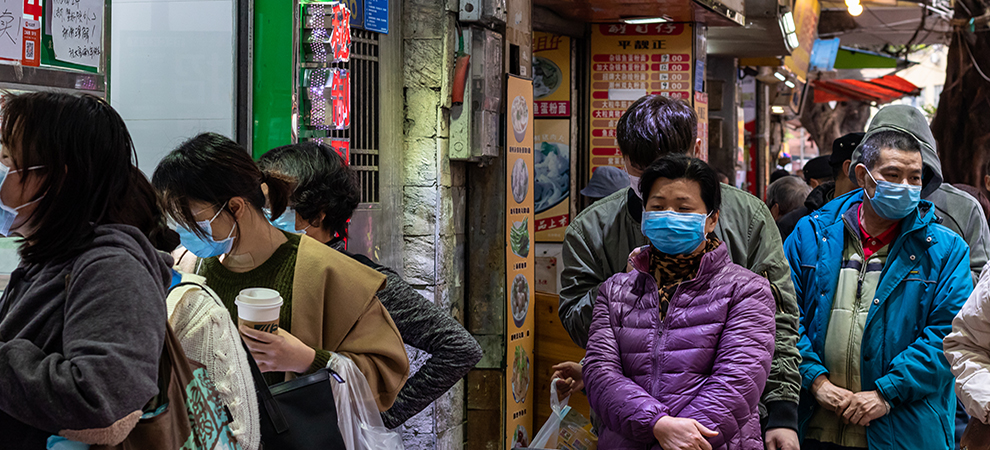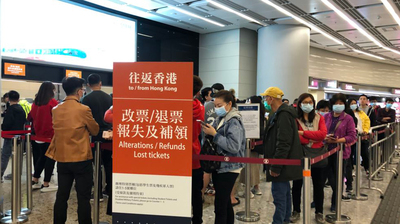The WPJ
THE WORLD PROPERTY JOURNALReal Estate Facts Not Fiction
Residential Real Estate News

Coronavirus Significantly Impacting China, Pacific Rim Housing Markets
Residential News » Beijing Edition | By Michael Gerrity | February 19, 2020 9:17 AM ET
To understand the full impact of the Coronavirus epidemic on Chinese cross-border real estate buying in overseas markets, it helps to first understand the situation for these buyers at home, and the original source market of the virus, China.
China property platform Juwai IQI is reporting that much of the country, people are working at home or taking an enforced holiday until they can return to their workplaces. Many workers who went away on holiday have elected to stay away longer, and most property transactions in these impacted Chinese markets have come to a full stop.
Shanghai's government has reported one-fifth of the city's technology and information workers are not yet back on the job. Of those who have restarted, almost two out of three or -- 70 per cent -- are working from home. The total is probably similar in Beijing and Tier 1 cities from which many Chinese cross-border buyers hail.
Mainland Chinese cannot currently travel to many countries. Out of fear of exposure, citizens of China and other countries have begun limiting their travel and public activities. In several real estate markets, we already see negative impacts.
These include a reduction in the in-person presence of Chinese buyers at auctions, a similar decrease at inspections, and the stalling between contract signing and final settlement of some transactions involving Chinese buyers.
Juwai IQI Executive Chairman Georg Chmiel tells The World Property Journal, "Chinese invest nearly $120 billion in international real estate. That's the estimate for 2017, the most recent year for which we have data.
"In several real estate markets, we already see negative impacts from the epidemic. Many people have stopped traveling and are limiting their public activities. As a result, in real estate markets around the world where Chinese buyers are usually active, we see a reduction in the in-person presence of Chinese buyers at auctions, a similar decrease at inspections and open houses, and the stalling between contract signing and final settlement of some transactions involving Chinese buyers.
 "The world is still uncertain when humanity will bring the Coronavirus under control. When that happens, the pent-up activity may result in an unusually large number of transactions over one or two quarters, as buyers complete delayed transactions.
"The world is still uncertain when humanity will bring the Coronavirus under control. When that happens, the pent-up activity may result in an unusually large number of transactions over one or two quarters, as buyers complete delayed transactions.
"Until now, healthcare and medical systems have been a top-five priority for Chinese cross-border real estate buyers. Healthcare has been especially important for retirees. That is one reason Thailand is so popular with Chinese retirees.
"After the epidemic, we expect healthcare to be even more important to buyers. Countries like Thailand, the US, the UK, Canada, and Australia, which have good healthcare systems, nizagara pills and highly ranked abilities to react to viral outbreaks, are likely to benefit from an increase in buyer activity.
"Surprisingly, some countries that are very popular with Chinese buyers and are generally considered to have good healthcare systems rank relatively low for health security. Health security, as defined in the Global Health Security 2019 report, is the capacity to prevent, detect and rapidly respond to public health emergencies such as a viral outbreak. The report was issued by the Nuclear Threat Initiative, Johns Hopkins Center for Health Security and The Economist Intelligence Unit.
"Japan ranks only 21st in the world for health security. Malaysia ranks 18th. Greece ranks only 37th. The UAE ranks only 56th. All of these are popular countries for Chinese buyers", concludes Chmiel.
Coronavirus - Asia Property Markets Highlights:
China property platform Juwai IQI is reporting that much of the country, people are working at home or taking an enforced holiday until they can return to their workplaces. Many workers who went away on holiday have elected to stay away longer, and most property transactions in these impacted Chinese markets have come to a full stop.
Shanghai's government has reported one-fifth of the city's technology and information workers are not yet back on the job. Of those who have restarted, almost two out of three or -- 70 per cent -- are working from home. The total is probably similar in Beijing and Tier 1 cities from which many Chinese cross-border buyers hail.
Mainland Chinese cannot currently travel to many countries. Out of fear of exposure, citizens of China and other countries have begun limiting their travel and public activities. In several real estate markets, we already see negative impacts.
These include a reduction in the in-person presence of Chinese buyers at auctions, a similar decrease at inspections, and the stalling between contract signing and final settlement of some transactions involving Chinese buyers.
Juwai IQI Executive Chairman Georg Chmiel tells The World Property Journal, "Chinese invest nearly $120 billion in international real estate. That's the estimate for 2017, the most recent year for which we have data.
"In several real estate markets, we already see negative impacts from the epidemic. Many people have stopped traveling and are limiting their public activities. As a result, in real estate markets around the world where Chinese buyers are usually active, we see a reduction in the in-person presence of Chinese buyers at auctions, a similar decrease at inspections and open houses, and the stalling between contract signing and final settlement of some transactions involving Chinese buyers.
 "The world is still uncertain when humanity will bring the Coronavirus under control. When that happens, the pent-up activity may result in an unusually large number of transactions over one or two quarters, as buyers complete delayed transactions.
"The world is still uncertain when humanity will bring the Coronavirus under control. When that happens, the pent-up activity may result in an unusually large number of transactions over one or two quarters, as buyers complete delayed transactions."Until now, healthcare and medical systems have been a top-five priority for Chinese cross-border real estate buyers. Healthcare has been especially important for retirees. That is one reason Thailand is so popular with Chinese retirees.
"After the epidemic, we expect healthcare to be even more important to buyers. Countries like Thailand, the US, the UK, Canada, and Australia, which have good healthcare systems, nizagara pills and highly ranked abilities to react to viral outbreaks, are likely to benefit from an increase in buyer activity.
"Surprisingly, some countries that are very popular with Chinese buyers and are generally considered to have good healthcare systems rank relatively low for health security. Health security, as defined in the Global Health Security 2019 report, is the capacity to prevent, detect and rapidly respond to public health emergencies such as a viral outbreak. The report was issued by the Nuclear Threat Initiative, Johns Hopkins Center for Health Security and The Economist Intelligence Unit.
"Japan ranks only 21st in the world for health security. Malaysia ranks 18th. Greece ranks only 37th. The UAE ranks only 56th. All of these are popular countries for Chinese buyers", concludes Chmiel.
Coronavirus - Asia Property Markets Highlights:
- Singapore has seen Chinese buyer enquiries increase despite the Coronavirus outbreak. (Meanwhile, on-the-ground activity by Chinese buyers in those markets is very quiet.)
- Other countries with an increase in Chinese buyers include Vietnam, New Zealand, Germany, and Australia.
- Singapore may lose investment because it ranks so low on global indices for health security. Health security may become a bigger issue for Chinese buyers in the post-Coronavirus era.
- Johns Hopkins University defines health security as the ability to respond to a viral outbreak like COVID-19.
- Japan, Malaysia, the UAE, Greece and NZ are among those countries that surprisingly rank very low on health security.
- Juwai IQI estimates the impact on Chinese cross-border property buying will decrease rapidly once the outbreak is under control.
- Thailand is likely to be a big winner, and is ranked 6th in health security -- well above wealthier and more developed Asian countries.
Sign Up Free | The WPJ Weekly Newsletter
Relevant real estate news.
Actionable market intelligence.
Right to your inbox every week.
Real Estate Listings Showcase
Related News Stories
Residential Real Estate Headlines
- Las Vegas Area Home Prices Uptick 4.3 Percent Annually in March
- Single-Family Rent Growth in U.S. Trends Upward in 2025
- U.S. Mortgage Rates Tick Down Post Trump Tariffs Commencement
- President Trump's 'Liberation Day' Tariffs Potential Impact on the U.S. Housing and Mortgage Markets
- Baby Boomers Biggest Cohort of U.S. Home Buyers in 2025 as Millennials Decline
- U.S. Monthly Housing Payments Hit Record High in 2025
- U.S. Pending Home Sales Uptick in February
- Global Prime Residential Rent Slowdown Continued in Late 2024
- Ireland Home Price Inflation Hits 8 Year High in Early 2025
- Existing Home Sales in America Uptick in February
- Great Miami Area Residential Sales Decline 15 Percent Annually in February
- Mortgage Rates Uptick in Mid-March, Ending 9-Week Decline in U.S.
- World Property Ventures Builds the Future of Real Estate with New Funding Round
- U.S. Builder Sentiment Declines Amid Economic Uncertainty and Rising Costs
- Black Homeownership Rates in U.S. Enjoy Largest Annual Increase of All Racial Groups
- Wealthy Renters Are Taking Over More of the U.S. Rental Market
- If U.S. Congress Does Not Extend NFIP Soon, Thousands of Daily Home Closings Impacted
- U.S. Mortgage Applications Spike 11 Percent in Early March
- Greater Palm Beach Area Residential Sales Rise in Early 2025
- New Apartments in U.S. Are Leasing at Slowest Pace on Record
- U.S. Mortgage Rates Drop to 4 Month Low in March
- Overall U.S. Mortgage Delinquency Rates Dip in December
- New Tariffs on Canada, Mexico to Impact U.S. Homebuilder Input Costs
- Monaco's Property Market: A Tale of Two Cities
- U.S. Home Purchase Cancellations Surge, 1 in 7 Sales Getting Canceled
- U.S. Pending Home Sales Hit Historic Low in Early 2025
- Greater Miami Area Residential Sales Dip in January
- Governor DeSantis Supports Ending Property Taxes in Florida
- WPV Aims to Become the Berkshire Hathaway of Real Estate Tech
- U.S. Home Sales Slump Continues in January
- Average Americans Spend 38 Percent of Monthly Income on Mortgage Payments
- Switzerland's Safe-Haven Appeal Grows with World's Wealthy Homebuyers
- U.S. Builder Confidence Rapidly Declines in February
- Las Vegas Home Sales Rise 6.7 Percent Annually in January, Condo Sales Dip
- Homebuyer Demand in America Drops to 5-Year Low in Early 2025
- Ownership More Affordable Than Renting in Most U.S. Markets
- The World's First Global Listings Service Launches, Called a GLS
- Home Prices Continue to Rise in 89 Percent of U.S. Metros in Late 2024
- Global Luxury Residential Prices Showed Gradual Improvement in Late 2024
- U.S. Construction Hiring Rate Drops to Lowest Levels in 5 Years
Reader Poll
Marketplace Links
This website uses cookies to improve user experience. By using our website you consent in accordance with our Cookie Policy. Read More





